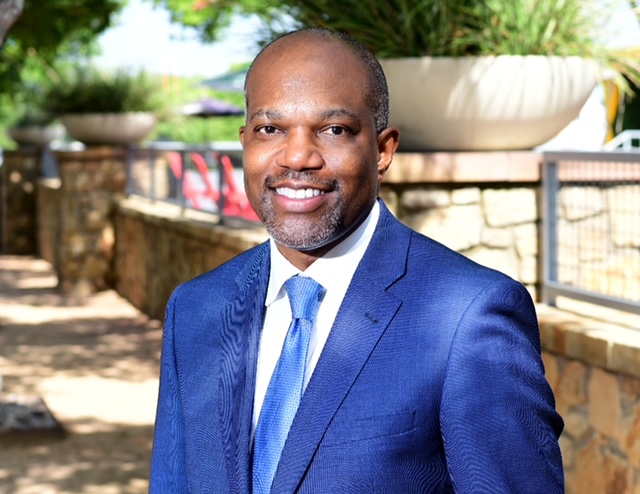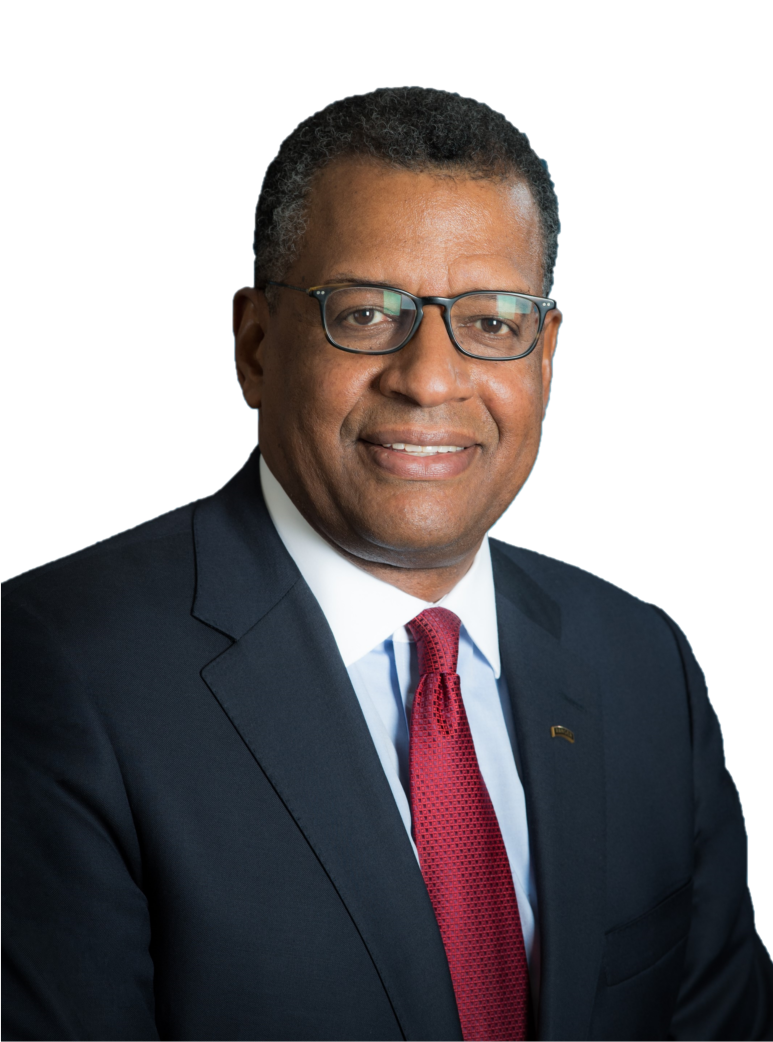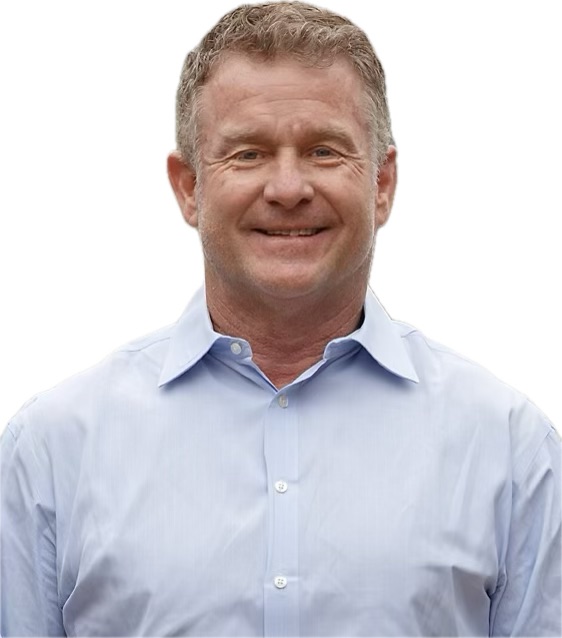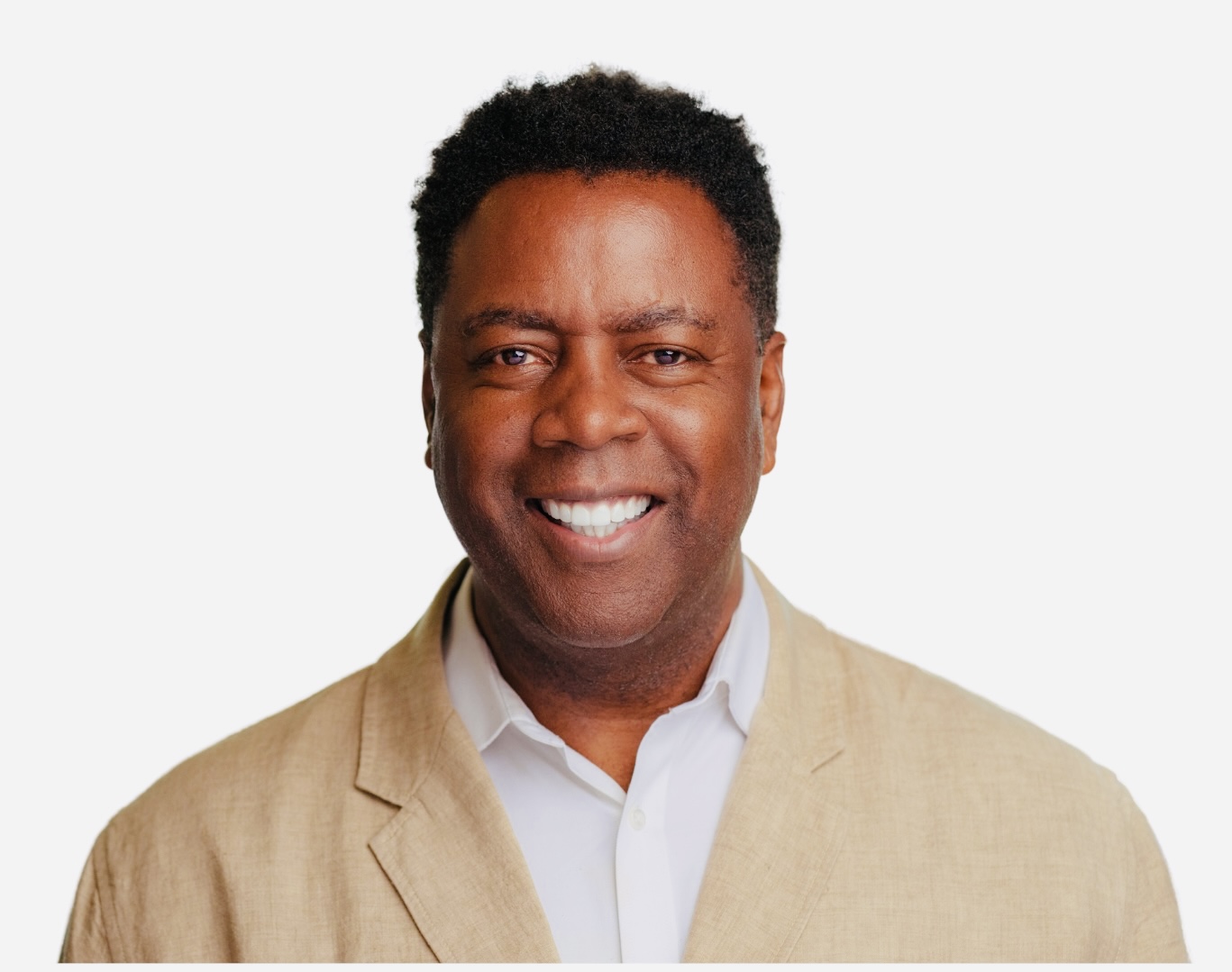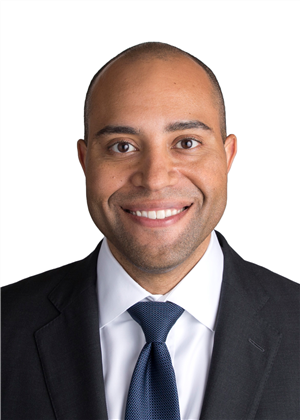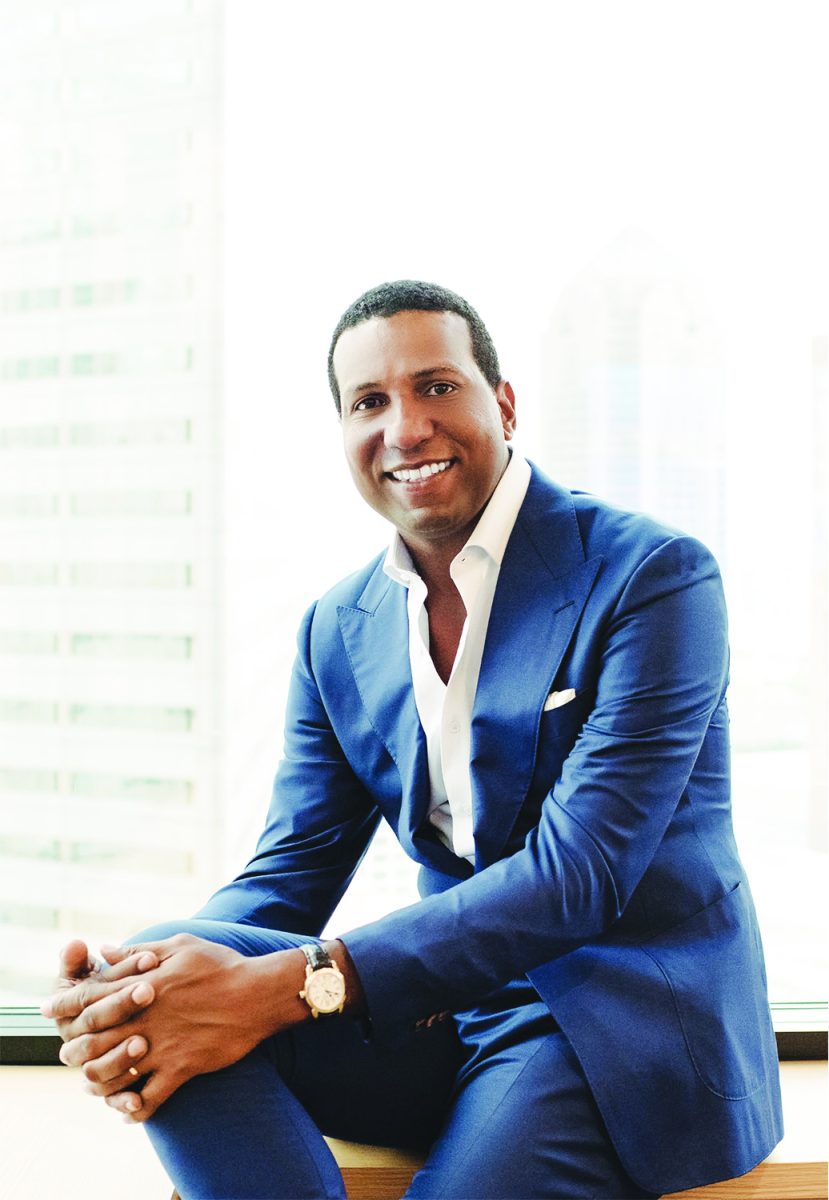Kelvin Walker is the CEO of the Dallas Citizens Council, composed of over 100 business leaders in the Dallas area. The Dallas Citizens Council serves to help shape practices and align policies around Dallas’s development and prosperity. Walker earned his B.A. in Finance from Morehouse College and his MBA from Northwestern University – Kellogg School of Management. Walker has been involved in the business world for over 25 years. Before leading the Dallas Citizens Council, Walker worked as Managing Director and Dallas Market Executive at RLJ Equity Partners. In addition to working with Dallas businesses, Walker has served on the boards of numerous Dallas nonprofit organizations, including the YMCA, Methodist Health System, the United Way of Metropolitan Dallas, the Dallas Foundation, and The Federal Reserve Bank of Dallas Business Community Advisory Council.
Lawrence: St. Marks teaches the concepts of character leadership in terms of leading with our head, heart, and hands, like to implement all three. How have these concepts helped you in different stages of your career?
Kelvin Walker: I agree with that. You cannot just be an example or talk about leadership. People will follow those who will do the same thing they ask others to do. There are things that I see in the Dallas Citizens Council that may be good. They’re good for the economy, business, and things we advocate for. But they’re also the right thing to do. I think they can always be both. You have to have a sense of compassion for people who need opportunities or where they’re where there are disparities. If you think about making a charity, that’s just a one-time thing. Oh, there’s a family in need, and you’re going to give him groceries one time; that’s great, but you should be thinking about, as a leader, how you can create an environment to help create this family whether it’s through upskilling for work so they can have a better job? What do I do with the leader to make sure I’m not just doing the charity part?
Lawrence:
What does servant leadership mean to you, and do you have any specific testimonials of leadership situations that resulted in change and affected communities around you?
Kelvin Walker: Servant leadership is all about you being the hands and feet. It’s one thing to advocate as a leader or have an organization. Imagine we’re going to give $10,000 and $25,000 to the XYZ organization because they need it, but you must also show up. Being present, particularly as a leader, demystifies the idea that you only want to give money. Much of the way to impact is to give up your time. You may not understand the dynamics of why you may be investing or contributing to a specific opportunity. So servant leadership means that you’re willing to do everything you ask others to do, and you are eager to show them how to do it and be that example, not just because you got this leadership position you want to tell what direct others to do.
Lawrence : How would you define these virtues of a leader?
Kelvin Walker: Leadership is something that you have to think about as being an active word. Leadership might be a word that is not a verb but must be made active. One of the first things I think about is collaboration. If we want to be less of a top-down organization, we want to collaborate with everybody. You have to have partners. What you can’t do is you can’t walk through to tell people what to do. You want to be collaborative. You want to thrive by humility. While we all have strong opinions, we all have Type A personalities, and you can lead and be humble. Ensure you’re not looking to get the credit; you want to share the credit.
An example would be our work around saving small businesses when everything shut down during the pandemic. We had to go into a hurry-up mode to raise money. We created an organization called Dallas Forward, which was set up principally to do free coaching and training for the smallest of small businesses, like Starbucks and the mom-and-pop businesses that had this shutdown, so they knew these tools were available. Many people collaborated and connected all the dots and resources. We put them all in one place and had to organize that in about; we organized it from the shutdown to the time we launched the site in six weeks. We raised 33.6, almost $4 million, in partnership with the Dallas Entrepreneur Center. Hence, they had additional forgivable loans to continue to exist and thrive while we were shut down. That’s probably the one that sticks out the most; the only other would be with my church during Hurricane Katrina years ago, where for us, in some ways, the world just stopped because we had, we had all these people streaming down I30 from Louisiana with nowhere to live with, no clothes, no food, and we had to set up, we set up shop, set up a store inside of our church for people to get for information about drivers licenses, find out where to live, where to put their kids in school, and so we had to just all figure out, just had to work. No one was really in charge. We all just jumped in and found something to do.
Lawrence:
How do you lead through unethical and ethical decision-making?
Kelvin Walker:
It is very simple. Don’t do it if it feels like it’s not right. It’s straightforward, and that is the way for me. Suppose I have to begin to debate or discuss. Can we do this? Then, 99 times out of 100, I’m gonna say I don’t want to do it because you don’t wish for the afterthought of what you did to be one where you continue to convince yourself that was the right thing because it was for your benefit, I mean, I think. That’s really where I draw the line.
Many colleges teach ethics classes. When I was getting my MBA, they began to talk about having courses on ethics, and my view was that if it feels wrong, don’t do it. I have had several situations in the investment world, such as private equity, where I met people who made unethical choices. For example, I met a guy who had a company that he wanted us to consider investing in. It wasn’t right for us, but during the call, he told me, well, you do know that my first cousin is a Houston firefighter teaching board member, and we were going before Houston firefighters to ask them for money. He wasn’t telling me, well, if you invest here, I’ll help you get this money. But he was throwing the connection immediately. I stopped the conversation and said, “Well, we can talk about that some other time.” Ultimately, we turned that deal down and ensured I created a bright line between him and me because I would never do those things. Was it unethical what he was doing? You feel it, and you know, say no.
Lawrence: How have you left your organization to success and uplifted those around you to fulfill their destiny?
Kelvin Walker:
For me, it’s been a fascinating journey. In the current job I’ve been in for the last four years, we’ve been slowly transforming to be much more outward-focused and outward-facing. We are known as a secretive, insular organization with all the powerful CEOs, so we could just say the City Council wants to do XYZ in the store. We have slowly moved to partner with other organizations, from the Hispanic Chamber to the Black Chamber to the North Dallas Chamber to executives in Plano. The idea is that none of us is an island, and none of us can do it alone. That’s how we evolve our leadership style; what we have done is become more of an organization. People are calling on us to partner with them instead of thinking there was this secret cabal trying to control Dallas. We’re much more transparent about how we will see Dallas thriving. Our motto was to lead, lead, and serve in the moments that matter the most pronounced. And when those moments that matter most, it can’t just be us.
There’s got to be other people. So again, having that collaborative spirit is one of the things that we’ve moved to in the last four years. We’ve broken down walls and silos and other organizations that have hurt feelings about working with us, as well as with elected officials who had the sense that we were probably putting our thumb on the scale too much on specific issues to being one where people feel like they want to partner with us. But it’s taken. All of COVID has sped it up because. They had all engaged in different ways, but that’s probably been the most significant thing on a concrete level that people would say before my joining till now.
Lawrence:
What do you believe are the essential elements of a good leader?
Kelvin Walker:
The essential elements of a good leader involve a positive mindset, integrity, and humility. Be willing to fail, own up to it, have a positive outlook, listen to your colleagues, teammates, and partners, and take that input. If you are invested in the opportunity to lead, make the best of that information to decide.
Lawrence:
What does it mean for you to be a good man or good woman?
Kelvin Walker:
I went to Morehouse, which is also an all-male school. It becomes a four-year focus, no different than your time in St Mark’s, and there are many different ways to look at them. It’s going to be well-balanced. You have to be well-read. You should be well-traveled. You should be well-spoken. It’s also one of these things that a good man takes many shapes, but it has to be someone you can always trust. I have many friends from college that I, whether I’ve seen them, haven’t seen them in a week, or haven’t seen them in 30 years. I know whatever they tell me, I can trust, and that’s you. You can’t replace the value with anything else, the value from trust.
Lawrence:
How have you used some of these essential elements of thriving to lead?
Kelvin Walker:
Before this job, I spent 20 years in private equity; before that, I was in investment banking. None of that, on paper, gets you to the job I have today, but during that 20-year journey in Dallas, I was a board chair of the YMCA, on the board of Methodist Hospital, and the board of United Ways. All this other stuff is very connected to the community. All those people I was meeting there, all those who thought I would be good in this role I’m in now. I’ve been able to do more in this job than even my 20 years of investing to truly thrive as who I am. But because I’m very connected to the community and I can bring a person, I bring perspective about how our entire community works from far north; to be thriving means bringing your whole self into the room, everything. Particularly as a black man walking in two rooms where I typically may be the only one, and we may be discussing a subject that could be thorny or have people be emotional when you think about the murder of Floyd and people talking about attacks on DI or diversity or anything that creates more and more inclusive economy. You can’t shrink from that moment. I’ve been able to speak up and speak in a way to the issues that allow our organization to be positioned to help all of our communities. Other people might have been able to have a particular perspective about it because I am not always less like most people who will be in the world.
Lawrence: What has been the most impactful to your organization as servant leaders, and how is this connected to your leadership style and those around you?
Kelvin Walker:
Working with small businesses was the most impactful during COVID. During my four years, they’ll be that and our advocacy around our bond campaigns to redo downtown. We would lead the campaign so to say, we’re going to raise this amount of money, we going to hire this firm, go away and do it right. We took the approach of bringing everybody in the world together. We’ve never done that before, and we will all work on this together so there’s a better outcome for everybody. We want Everybody to feel included from the beginning, but you still have to execute. It was probably the last bond campaign where we raised money to ensure the voters favored the new Convention Center, which had just happened last November. It’s perhaps the most impactful I’ve been in this role. We’ve got a couple of initiatives I’m working on now, which I believe will be could be legacy-making for our organization around growing the economy by bringing more people who are unskilled into getting them the skills they need to go from poverty to a living wage but that’s going to take 12, 24 months to get going.
Lawrence:
What is the best way to prepare to become a leader and how have you prepared those in your organization to lead effectively through character?
Kelvin Walker:
The second part of your question should be the first. What I’ve always done is give opportunities to all of my teammates. What a leader cannot do if they want to develop other leaders; they can’t do it all themselves. You have to create room for others to do the work and lead projects and give them the room to do it right and give them the opportunity not to get it right because that’s how you learn sometimes. That’s very key because if you don’t do that, what happens is you got one leader out here with no succession plan. Every leader should always be thinking I’m growing people who can replace them, whether you’re ready to be replaced or not. Your job is to equip organizations that where you could, you can run without you. All organizations are personality driven. But it should be; you should be able to leave someone to step in and say I’m going to do 80% of what we used to do, and another 20% is what I know to do, but it’s a way that the organization should still thrive. There are so many small businesses and small organizations. The founder or the CEO quits or dies or leaves, and the organization goes away. You should never want to be the kind of leader who can’t survive without you.
In response to the first part of your question, how do you prepare to be a leader? You have to jump in and participate, and I don’t think there’s any set of books you can read. I mean, yeah, if you’re in scouting, that helps. If you play sports and you get to a position where you have to rally your teammates, all those things help. But it’s more of all, in all the situations you find yourself, whether you’re on a debate team or playing football. You know, clubs, volunteering to take on a project, asking questions, listening, and, if you see someone that you think is a great leader or a good leader or someone of a good character. Study, then watch how they lead. It may not be your style, but watch how they lead, and then you have to put that in the context of how you would do it. All those kinds of cues lead you to, I think, the steps toward leadership and then part of it. Once you get no one, you can think of all these things to do, but once you get in the seat yourself, it’s a different feeling, no matter how much you have been prepared. That’s the point at which you really have to step in and do your best.


